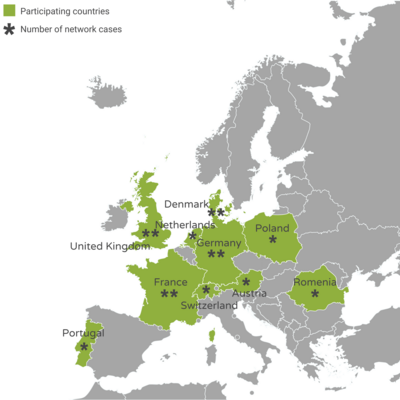
Farmers will need to adapt to climate change and develop farming systems that are simultaneously financially attractive, efficient in the use of resources, and resilient to fluctuating environmental and socio-economic conditions. Moreover, in addition to the production of food, agriculture must also contribute to mitigation of climate change through increased carbon sequestration and reduced nutrient losses and GHG emission. To address such multiple objectives and challenges, the approach must be holistic and include a mixed production of feed and bioenergy as well as ecosystem services.
The optimal combination of productions to achieve these benefits will depend on the pedo-climatic conditions as well as the regional socio-economic conditions and challenges. 14 existing farmer Networks have been identified located in 10 countries in Europe (see map to the right) practicing mixed farming and/or agroforestry, that hold significant innovation potential in terms of efficiency and resilience, and which will be actively involved in development and implementation of project activities. 8 of the identified networks are associated with the farmers’ organisations which are MIXED project partners and 6 are groups of farmers with whom MIXED academic partners have on-going collaboration or where collaboration has recently been initiated. The farmers’ organisations and the academic partners thus act as so-called Network Coordinators.
Common for all 14 networks is that farmers are driven by a desire to practice climate-smart and resilient farming, which is also what drives their willingness to be actively involved in the project.
These Networks are organised into three Themes based on the combination of livestock, trees and arable crops, and with varying within-theme focus on, for example, different forms of organisation and innovative collaboration models. Each Theme includes Networks from three or more countries with a wide range of mixed farming characteristics:
